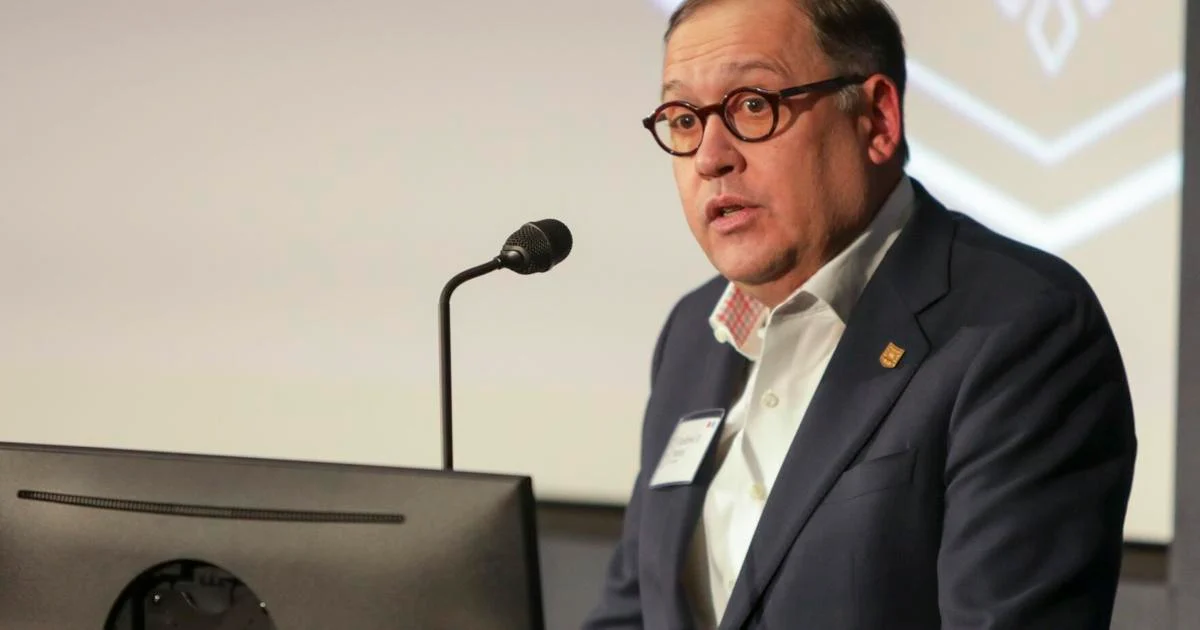
ST. LOUIS — Faculty members called on Washington University leaders to provide more details on the reasons behind the elimination of 300 campus jobs, saying the administration’s talk of “internal decisions” have only added a growing sense of frustration among staff and uncertainty for some students.
Faculty who spoke with the Post-Dispatch Wednesday said they are looking for more answers as to why the university made the “difficult steps,” as the chancellor put it in a Tuesday announcement, to eliminate 316 staff positions and close 198 unfilled vacancies.
Seth Graebner, president of WashU’s chapter of the American Association of University Professors, said faculty are looking for specifics.
“The new message from administration promises transparency about the difficulties the university is facing, but it attributes the staff reduction to ‘internal decisions and structures’ without saying what those are,” Graebner said.
Chancellor Andrew Martin, in his announcement posted to the university’s website Tuesday, said the reductions would allow WashU to maintain a “sustainable path forward” as the university grapples with the loss of federal grants and other outside funding. He also blamed internal issues that derived from “ineffective processes and redundancies” over time.
The cuts were made to WashU’s Danforth and medical campuses, as well as its “central fiscal unit,” which refers to administrative divisions outside of the university’s individual schools, including IT and police.
Tuesday’s announcement followed calls for university leaders to explain the job cuts made since March.
Before the chancellor’s announcement, employees learned of spending reductions in piecemeal fashion.
Various units over the last several months had made internal announcements of spending reductions, citing “potential federal changes,” a “shifting higher education landscape” and “significant financial challenges.”
Arts & Sciences announced cuts of 12% to all academic department operating budgets and cuts of 20% or more to the number of PhD stipends in each department. McKelvey School of Engineering’s dean said 25 positions had to be cut. StudLife, WashU’s student newspaper, has reported two long-time librarians were let go over the summer.
Few employees received cost-of-living increases this year, after Martin said a halt was a required step to ensure “long-term institutional stability.”
WashU’s latest financials, for the fiscal year that ended June 30, have yet to be released, but internal and public communications by university leaders indicate the school has been concerned about a budget deficit.
CFO David Gray, in a May 14 email co-signed by other top brass, cited “challenges of revenues short of our spending aspirations.”
In a July communication to faculty and staff, Martin said he anticipated WashU would break-even as it closed the books on fiscal year 2025.
“With that said, we have identified some structural budget challenges that WashU must address,” Martin said.
A review of the university’s audits over the past 10 years shows expenditures have slightly outpaced revenue growth, but WashU still ended last fiscal year with a $150 million operating surplus.
The American Association of University Professors has circulated a petition among faculty, calling on WashU’s chief financial officer to provide details on WashU’s financial situation at a special session of the faculty senate later this month.
There has been public speculation among faculty that WashU made unsustainable investments after an unprecedented 65% return on the university’s endowment in 2021. WashU subsequently invested $1 billion in financial aid and went “need blind,” meaning it did not take into account students’ ability to pay tuition when it accepted them. It also adopted a “no loan” policy in 2023 that removed federal loans from undergraduate financial packages and replaced them with scholarships and university grants.
WashU has spent about $33 million more on financial aid since June 2022, financial disclosures show.
“I think it’s pretty clear the university spent more money than was justified by its actual financial results, and many faculty would like to know what was that decision-making process, what assumptions went into it, and what the administration will do in the future to prevent such things from happening again,” Graebner said.
Gary Stocker, a St. Louis-based higher education analyst and founder of College Viability, said elite universities across the country are using revenue from layoffs to subsidize research.
He suggested some elite universities, such as WashU, may be using federal turmoil as a scapegoat to eliminate bloat.
“In my opinion, there’s a likely scenario where many of those research funds come back,” Stocker said. “The question is, will those, like WashU, who laid people off, bring them back? Or are they using this as an opportunity to cut expenses that they otherwise would not have?”
Students are watching the reductions unfold with unease.
One international graduate student, who spoke on condition of anonymity out of concern about retaliation by the government or university, said news of the job cuts compounded a sense of fear created by the Trump administration’s attempts to curb immigration.
“There’s no transparency about why,” the student said. “It’s stressful because the government is so unpredictable, and now the university is unpredictable, too.”
Maya Irvine received her undergraduate degree from WashU in this spring. She said she wanted to pursue her PhD at WashU afterward, but chose to take a gap year after her chosen program could not accept her due to budget cuts.
She is applying to other PhD programs as she works as a lab technician, but said her prospects are not looking good.
“Many of the professors I’ve spoken to have told me that they are unsure about what the status of funding may look like in the future,” Irvine said.
Want to see more like this?
Get our local education coverage delivered directly to your inbox.
* I understand and agree that registration on or use of this site constitutes agreement to its user agreement and privacy policy.
Monica Obradovic | Post-Dispatch
Education reporter
Get email notifications on {{subject}} daily!
Your notification has been saved.
There was a problem saving your notification.
{{description}}
Email notifications are only sent once a day, and only if there are new matching items.
Followed notifications
Please log in to use this feature
Log In
Don’t have an account? Sign Up Today



